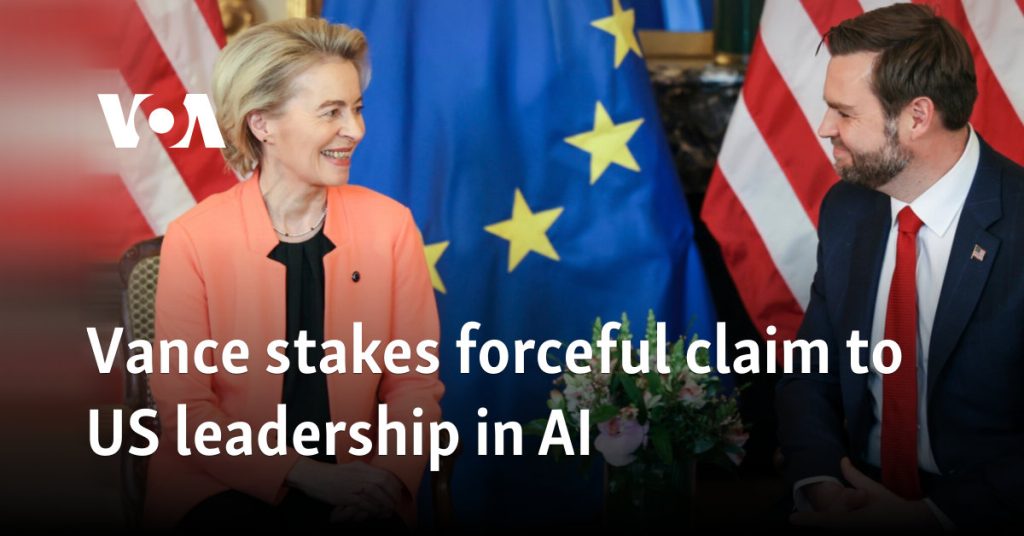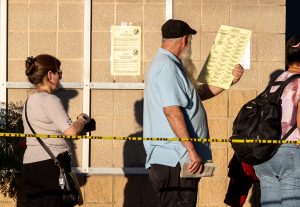
U.S. Vice President J.D. Vance on Tuesday vowed that the United States would maintain its leadership position in the development of advanced artificial intelligence and warned leaders of other countries not to adopt regulatory standards that might “kill” the new technology “just as it’s taking off.”
“The United States of America is the leader in AI, and our administration plans to keep it that way,” Vance told an audience of world leaders at an AI summit in Paris. He said the administration of President Donald Trump “will ensure that the most powerful AI systems are built in the U.S. with American-designed and manufactured chips.”
Vance said that the U.S. is open to collaboration with its allies. “But,” he said, “to create that kind of trust, we need international regulatory regimes that foster the creation of AI technology rather than strangles it, and we need our European friends in particular to look to this new frontier with optimism rather than trepidation.”
Regulations criticized
The vice president criticized the European Union’s regulatory structure, in particular the privacy-focused General Data Protection Regulation and the misinformation-focused Digital Services Act, and he said the Trump administration will not accept foreign governments “tightening the screws on U.S. tech companies with international footprints.”
Vance also appeared to criticize the effort in Europe to replace power generated by burning fossil fuels with more sustainable sources, saying that countries are “chasing reliable power out of their nations” at a time when AI systems demand ever-greater access to electricity.
“The AI future is not going to be won by handwringing about safety,” Vance said. “It will be won by building — from reliable power plants to the manufacturing facilities that can produce the chips of the future.”
While dozens of countries in attendance at the summit signed a joint declaration on “building trustworthy data governance frameworks to encourage development of innovative and privacy-protective AI,” the U.S. and U.K. did not.
More calls for reduced regulation
Although not as dismissive of regulations and safety concerns as Vice President Vance, other leaders at the summit appeared to agree that the regulatory burden on companies in the AI field should be lightened.
French President Emmanuel Macron, the summit’s host, said that while safety concerns are important, Europe also needs to make it easier for AI firms there to move quickly and innovate at the same pace as other countries.
“At the national and European scale, it is very clear that we have to resynchronize with the rest of the world,” Macron said.
European Commission President Ursula von der Leyen defended the bloc’s privacy regulations and other standards, pointing out that they are meant to help businesses by creating rules that apply uniformly across all 27 member countries.
“At the same time, I know that we have to make it easier, and we have to cut red tape — and we will,” von der Leyen said.
Veiled China comments
Chinese Vice Premier Zhang Guoqing, who also attended the summit, said Beijing is prepared to work with other countries to develop AI technology, and it is willing to share its discoveries in the field with the aim of creating “a community with a shared future for mankind.”
In his remarks on Tuesday, Vance did not mention China by name but appeared to warn other nations against engaging in the kind of collaboration that Zhang described.
Vance spoke of “hostile foreign adversaries” that “have weaponized AI software to rewrite history, surveil users and censor speech” and authoritarian regimes that have “stolen and used AI to strengthen their military intelligence and surveillance capabilities to capture foreign data and create propaganda to undermine other nations national security.”
Partnering with authoritarian regimes, Vance said, “means chaining your nation to an authoritarian master that seeks to infiltrate, dig in and seize your information infrastructure.”
The remarks came at a time when the U.S. is taking wide-ranging action to prevent China from gaining access to the most cutting-edge AI technologies. Recent news reports revealing that a seemingly innovative Chinese AI chatbot known as DeepSeek has been collecting user data and storing it on insecure servers in China has led several nations to restrict access to the service.
On Monday, Chinese Foreign Ministry spokesperson Gou Jiakun said in a press conference: “We take the safety and security of AI seriously, and support entrepreneurial innovation by Chinese companies, thus contributing China’s part to global AI development.”
“We have helped developing countries enhance capacity building, advocating that AI technologies should be open-sourced and there should be greater accessibility to AI services so that the benefits of AI can be shared by all countries. That said, we are against drawing lines along ideological difference, overstretching the concept of national security, or politicizing trade and tech issues,” Gou said.
Tech researchers concerned
Vance’s remarks about excessive AI safety concerns were in sync with actions taken so far by the Trump administration. On the day he took office, President Trump rescinded an executive order signed by his predecessor entitled, “Safe, Secure, and Trustworthy Development and Use of Artificial Intelligence.”
Following Vance’s remarks Tuesday, U.S.-based artificial intelligence researchers warned that a world in which the U.S. declines to require companies to adopt AI safety precautions could make collaboration with colleagues in countries with stronger protections difficult.
“In order to build effective AI, you have to source data globally, so you have more accurate, complete and representative data sets,” Susan Ariel Aaronson told VOA. She is a professor at George Washington University and co-leader of the National Science Foundation’s Trustworthy AI Institute for Law and Society.
“Many AI researchers believe we’re running out of data,” Aaronson said. “The future for these firms, the future [for these] markets are overseas, and so we need rules to govern how we interact with policymakers and users in those markets.”
Mona Sloane, a professor at the University of Virginia who leads an AI research lab, told VOA that maintaining access to those data sets is a prevailing concern.
“If you talk to people in the research community in the United States, those folks are acutely worried about access to data sets, about collaborating [internationally] on AI questions, or using AI in their research,” she said.
“There will be very severe implications for research in the United States on AI — but also with AI — by getting cut off from these international conversations,” Sloane said.








